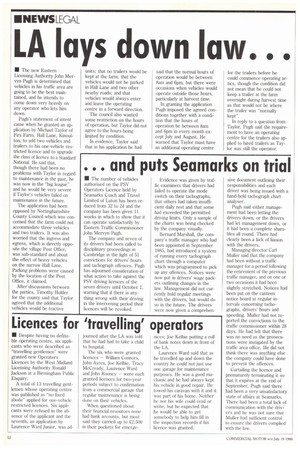and puts Seamarks on trial
Page 14

If you've noticed an error in this article please click here to report it so we can fix it.
• The number of vehicles authorised on the PSV Operators Licence held by Seamarks Coach and Travel Limited of Luton has been reduced from 32 to 24 and the company has been given 11 weeks in which to show that it can operate satisfactorily by Eastern Traffic Commissioner John Mervyn Pugh.
The company and seven of its drivers had been called to disciplinary proceedings in Cambridge in the light of 51 convictions for drivers hours and tachograph offences. Pugh has adjourned consideration of what action to take against the PSV driving licences of the seven drivers until October 1, warning that if there is anything wrong with their driving in the intervening period their licences will be revoked.
Evidence was given by traffic examiners that drivers had failed to operate the mode switch on their tachographs, that others had taken insufficient daily rest and that some had exceeded the permitted driving limits. Only a sample of the charts was being checked by the company visually.
Bernard Marshall, the company's traffic manager who had been appointed in September 1985, had introduced a system of running every tachograph chart through a computer which was programmed to pick up any offences. Notices were now put in drivers' wage packets outlining changes in the law. Management did not currently hold regular meetings with the drivers, but would do so in the future. The drivers were now given a comprehen
sive document outlining their responsibilities and each driver was being issued with a hand-held tachograph chart analyser.
Pugh said either management had been letting the drivers down, or the drivers had let management down, or it had been a complete shambles all round. There had clearly been a lack of liaison with the drivers.
Managing director Carl Muller said that the company had been without a traffic manager for a period following the retirement of the previous traffic manager, and on one or two occasions it had been slightly stretched. Notices had been put on the canteen notice board at regular intervals concerning tachographs, drivers' hours and speeding. Muller had not reported the convictions to the traffic commissioner within 28 days. He had felt that there was no need as the prosecutions were instigated by the traffic area office. He did not think there was anything else the company could have done to prevent the offences.
Curtailing the licence and prematurely terminating it so that it expires at the end of September, Pugh said there had been a very unsatisfactory state of affairs at Seamarks. There had been a total lack of communication with the drivers and he was not sure that Muller had sufficient control to ensure the drivers complied with the law.




























































































